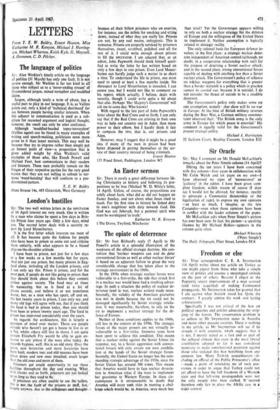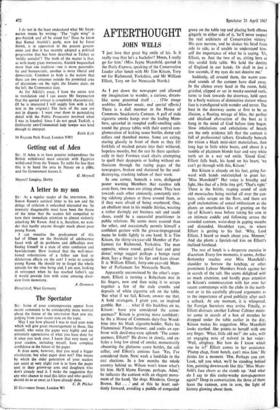Freedom or else
Sir: Your correspondent C. R. A. Swynnerton (14 April) writes about my article on Turkey as one might expect from those who take a simple view of politics and assume a stereotyped attitude on the part of others. Because I object to the flagrantly unjust imprisonment of a man accused (and twice acquitted) of making Communist propaganda, Mr Swynnerton takes for granted that I am against what Atatilrk stood for. Quite the contrary: I greatly admire his work and lasting achievements.
Specifically I was not critical of the ban on political speeches and articles advocating the strip- ping of the forests. The conservation problem is as serious as Mr Swynnerton states in Anatolia and many other peasant societies. There is nothing in my article, as Mr Swynnerton will see if he rereads it with attention, which suggests that it is not. I merely stated as a fact and as part of the cultural climate that even in the most liberal constitution adopted so far it was considered necessary to make constitutional provision against those who violated this ban benefiting from any amnesty law. Many Turkish acquaintances--in- eluding an official of the Public Prosecutor's office —made a point of reminding me of such pro- visions in order to argue that Turkey could not yet afford to have the full freedoms of a Western state and that left-wing propagandists were not the only people who were curbed. ft 'seemed ' therefore only fair to place the Alkilic case in a wider context I do not in the least understand what Mr Swyn- nerton means by writing: 'The "right wing" is pro-Atattirk and all he stood for.' Does he know that Kemal Atatfirk's party, now led by Ismet Mon& is in opposition to the present govern- tient and that it has recently adopted a political programme that has been described in Turkey as 'mildly socialist'? The truth of the matter is that, as with•many great innovators, Atattirk bequeathed more than one tradition—one is more paternalis- tic and bureaucratic, another is more liberal and democratic. Common to both is the notion that there are two extremes outside the permitted area of discussion—on the right, the Islamic state; on the left, the Communist state.
As for Alkilic's essay, I' have the entire text in translation and I can assure Mr Swynnerton that the quoted extract is completely characteristic. (If he is interested I will supply him with a full text in the original.) The facts of the case are not in dispute: I went over them in painstaking detail with the Public Prosecutor involved when I was in Istanbul. Since I do not speak Turkish. a (militantly anti-Communist) lady lawyer. was -kind enough to interpret.







































 Previous page
Previous page